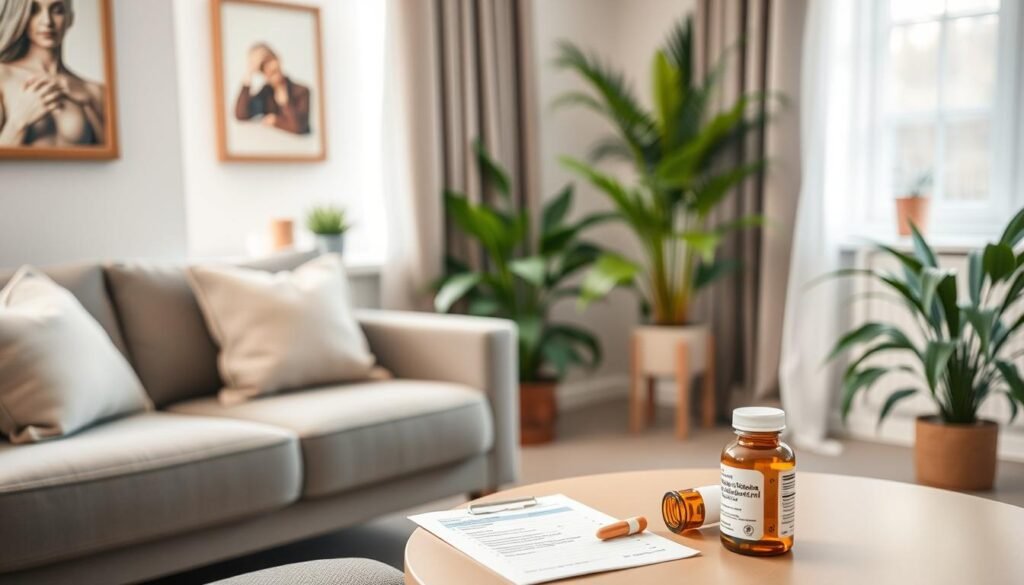About 1 in 5 adults in the US face mental health issues yearly. It’s important to understand depression and anxiety to improve mental well-being. Taking steps towards a healthier mind can lead to a better life.
This guide provides strategies to fight depression and manage anxiety. It suggests making friends, exercising, and eating well. Remember, you’re not alone. With the right support, happiness is possible.
Key Takeaways
- Staying in touch with friends and family can significantly improve one’s mood.
- Regular exercise can be as effective as medication for relieving symptoms of depression.
- Facing difficult situations can reduce anxiety rather than avoiding them.
- Establishing a healthy sleep routine is crucial for overall well-being.
- Seeking professional help is essential if feelings of sadness persist.
Understanding Depression and Anxiety
Understanding depression and anxiety is crucial for promoting anxiety awareness. It involves knowing the impact these conditions have on many. Depression includes symptoms like constant sadness, feelings of hopelessness, and altered eating or sleeping habits. About 17.3 million adults in the U.S. had a major depressive episode in 2017, showing how common it is.
Anxiety disorders are also a big concern for mental health. Conditions like Generalized Anxiety Disorder (GAD) and Obsessive-Compulsive Disorder (OCD) are partly genetic. They can be passed down in families, similar to allergies or diabetes. Anxiety and depression often occur together. The National Alliance on Mental Illness (NAMI) finds that 60% of people with anxiety will also face depression.
Knowing depression well means understanding its effects on everyday life. Symptoms such as irritability, muscle tightness, and trouble focusing can really disrupt lives. This impacts work and personal relationships. Anxiety disorders often come with physical illnesses, making symptoms worse.
Treating depression and anxiety requires different methods for different people. Help from healthcare providers or support from loved ones is important. This support encourages conversations about seeking help. For detailed information on symptoms and help, please visit this helpful source.
| Condition | Common Symptoms | Prevalence |
|---|---|---|
| Depression | Persistent sad mood, hopelessness, sleep disturbances | Approx. 16.2% lifetime prevalence |
| Anxiety Disorders | Restlessness, fatigue, difficulty concentrating, muscle tension | Affects millions; 60% also have depression |
Knowing the signs of these conditions can lead individuals to get the help they need. Reaching out is an important first step towards healing.
How to Overcome Depression and Anxiety
Understanding how to tackle depression and anxiety is crucial. Many suffer from a lack of energy and motivation. They find it hard to make necessary changes for recovery. Recognizing this is the first step towards feeling better.
The Nature of Depression and Anxiety
Depression brings feelings of sadness and disinterest. Anxiety is full of fear and worry. About 60% of those with anxiety also face depression. Knowing about both is vital for handling them.
The Impact on Daily Life
Anxiety and depression heavily affect daily life. They can cause panic attacks and make socializing hard. Having strong connections helps; a group on Facebook, “I BEAT ANXIETY DEPRESSION, now what?” is a great support space.
Healing involves daily effort like journaling and exercise. Avoiding your fears can worsen depression. Treatments, including therapy and yoga, are helpful.
| Symptoms | Depression | Anxiety |
|---|---|---|
| Common Symptoms | Sadness, lack of energy, loss of interest | Excessive fear, worry, panic disorders |
| Physical Manifestations | Sleep disturbances, changes in appetite | Panic attacks, avoidance behaviors |
| Associated Conditions | May lead to chronic hopelessness | Can result in social withdrawal |
| Treatment Approaches | Therapy, medication, lifestyle changes | Relaxation techniques, counseling, medication |
The Importance of Social Connections
Social bonds are key to our mental health. Talking to people we care about makes us feel less alone. It helps fight off feelings of isolation. Connections with friends and family build a sense of community, key for a good life.
Staying in Touch with Loved Ones
Keeping up with people needs work, especially when times are hard. Setting times to chat, video call, or meet helps a lot. Those who feel supported by friends face less depression and sleep better. Keeping in contact makes people feel loved and important. It helps them stay strong mentally.
Joining Support Groups
Support groups are a great place to make friends. They can be in person or online. They let people talk about their problems and learn from each other. This helps fight loneliness and leads to healthier living. Having people you can trust makes you stronger. To learn more about how socializing is good for you, click here.
Managing Stress for Better Mental Health
It’s vital to manage stress to keep your mind healthy. Stress shows up in different ways. It can affect your body, your relationships, and how you handle day-to-day tasks. Knowing what causes your stress is the first step in finding good solutions.
Identifying Sources of Stress
Determining your stress triggers is key. Notable causes include:
- Relationships: Conflicts or family issues can cause ongoing stress.
- Work-life balance: Too much work can make you feel out of control.
- Money concerns: Worrying about finances is a big stress factor for many.
- Substance reliance: Turning to alcohol, smoking, or drugs can increase stress.
Implementing Healthy Coping Mechanisms
Adding healthy coping strategies can lower your stress significantly. Exercise helps reduce tension and improves your well-being. Other helpful habits include:
- Ensuring adequate sleep: A regular sleep schedule boosts your ability to handle stress.
- Maintaining a balanced diet: Eating right helps control stress hormones and keeps your energy up.
- Practicing self-care: Taking time to relax or do fun activities helps your emotional health.
Practicing Mindfulness Techniques
Mindfulness is a powerful tool against stress. It makes you emotionally stronger. Practices like meditation, journaling, and deep breathing bring peace. Being kind to yourself helps avoid bad thoughts and builds a happier outlook.

Incorporating Regular Exercise
Regular exercise is key to fighting depression and anxiety. It offers more than just physical health benefits. It also boosts your mood and helps manage mental health.
Benefits of Physical Activity
Exercise can make you feel better and give you more energy. Scientists say it increases certain chemicals in your brain. This leads to a healthier brain and less depression.
People who work out regularly often feel less sad over time. They get happier because exercise is like a natural antidepressant.
- Improves mood by triggering the release of endorphins.
- Acts as a natural antidepressant, comparable in efficacy to traditional medication.
- Enhances overall well-being by promoting better sleep quality.
- Fosters social connections through group activities, reducing isolation.
Types of Exercise to Boost Mood
Many exercises can lift your spirits and help your mental health. Here are some:
| Type of Exercise | Description | Benefits |
|---|---|---|
| Aerobic Workouts | Activities like running, cycling, and swimming | Endorphin release, improved cardiovascular health |
| Yoga | Combines physical movement with mindfulness | Increased relaxation and mental clarity |
| Strength Training | Use of weights or resistance bands | Boosts self-esteem and reduces depressive symptoms |
| Walking | Simple yet effective, anytime and anywhere | Accessible and lowers stress levels |
Making exercise a regular part of your life can really help with depression. It’s amazing because it helps your brain change and heal. Finding an exercise you love makes a big difference in your mental health.
Developing Healthy Eating Habits
A strong connection exists between healthy eating and overall mental health. Food choices play a key role in our mood, energy, and feelings. By understanding the link between diet and mental health, people can make better food choices. These choices help improve mood while lowering anxiety and depression symptoms.
The Role of Nutrition in Mental Health
Many studies have shown diet’s impact on mental health. Eating a diet with lots of fruits, vegetables, and proteins is vital for mood stability. Foods like lean meats, legumes, and fish rich in omega-3, such as salmon, are very helpful. Including whole grains can raise serotonin levels, making us feel calmer. Focusing on healthy eating supports mental health and lessens feelings tied to depression.
Foods That Can Enhance Mood
Some foods are known to improve mood and help manage depression:
| Food | Benefits |
|---|---|
| Salmon | Rich in omega-3 fatty acids, supporting brain function and reducing anxiety. |
| Leafy Greens | High in folate, which can help protect the nervous system. |
| Whole Grains | Complex carbohydrates that elevate serotonin levels for mood stabilization. |
| Blueberries | Packed with antioxidants that reduce oxidative stress linked to anxiety. |
| Nuts | Contain selenium and zinc, which may improve mood and aid in depression management. |
Staying hydrated is also key; even slight dehydration can impact mood negatively. While caffeine and alcohol might seem calming at first, they can actually make you more anxious and disrupt your sleep. Choosing a healthy, balanced diet full of whole foods can make real, lasting improvements in mental health. It also helps in developing good strategies to deal with stress.

Establishing a Daily Routine
A structured daily routine can really help in battling depression. People often feel lost, which can make depression worse. Having a regular schedule brings back a sense of control. Adding fun activities and focusing on self-care makes you feel better overall.
Creating Structure to Combat Depression
A predictable routine can lower anxiety and depression, says Dr. Ramon Solhkhah. He suggests keeping things simple, like:
- Waking up at the same time every day
- Showering and dressing for the day
- Eating meals at regular times
- Engaging in daily exercise
- Limiting screen time
- Going to bed at a consistent time each night
Having a routine each day can boost your mood and cut down on depression risks. Organizing your living spaces into different zones helps you focus and stay organized.
Keeping a Sleep Schedule
Good sleep is key for mental health. A 2021 study found that not sleeping regularly can increase depression risk. Try starting a bedtime routine 30 minutes before sleep to sleep better. This might include relaxation exercises, reading, or mindfulness.
Following a sleep schedule improves sleep habits, mental clarity, and emotional stability. Staying consistent with your wake-up time boosts your mental health.
Seeking Professional Help
Many people dealing with depression and anxiety find professional help boosts their journey to recovery. Getting the right help offers insight and helps sort through available treatment options. Knowing about these options gives people the tools they need for a crucial move towards getting better.
Treating Depression with Therapy
There are many effective therapy choices for depression. Cognitive Behavioral Therapy (CBT) is a top choice. It helps people see and change negative thoughts. Therapy for depression provides deep understanding and better coping strategies.
Platforms like Brightside Health and Talkspace make therapy more accessible. They fit into peoples’ schedules easily. Here, people find ways to cope and manage their symptoms better.
Exploring Medications for Anxiety and Depression
Medicines are key in treating anxiety and depression. Selective serotonin reuptake inhibitors (SSRIs) such as Prozac and Zoloft are widely used. They have fewer side effects. Serotonin-norepinephrine reuptake inhibitors (SNRIs) such as Cymbalta also boost mood by balancing brain chemicals.
Those curious about these options can learn more about medications for anxiety and their impact. Talking to healthcare providers helps tailor the right treatment plan, raising the chances of a successful recovery.

Finally, getting professional help is essential and often key in overcoming depression and anxiety. Therapy combined with the right medication offers a full approach that helps many people.
Exploring Self-Care Strategies
Self-care is key in handling depression and anxiety. It involves doing activities that improve your mental health. This can give you a break and bring back balance in life.
Finding joy in hobbies and interests builds your ability to handle daily challenges better. They make it easier to deal with tough times.
Engaging in Activities You Enjoy
Doing things you love helps your emotional health. Try to include hobbies like painting, gardening, or music in your day. These can lift your mood and distract you from negative thoughts.
- Encourage creativity through artistic projects.
- Include physical activities like dancing or hiking.
- Explore new skills, such as cooking or learning a language.
Practicing Relaxation Techniques
Relaxation methods are crucial for lessening stress and boosting mental health. Yoga or deep breathing can calm your mind and bring peace. Doing these regularly helps manage your emotions and fight anxiety.
- Consider trying guided meditation or mindfulness sessions.
- Practice deep breathing to manage anxiety symptoms.
- Use calming playlists to enhance relaxation during stressful times.
Conclusion
Getting better from depression and anxiety takes time and is very personal. This guide talked about how being with others, handling stress, and staying active are key. Small changes in how we live can make a big difference in our happiness.
Even if depression or anxiety isn’t strong, being part of groups that support you helps. Many see their regular doctors for advice. This shows how important these doctors are in giving kind care. For some, talking to a therapist or taking certain meds is needed for their mental health.
It might be slow, but you can beat depression and anxiety. Staying connected, caring for yourself, and being active in bettering your health are crucial steps. Doing these can help build strength and give us hope for a better tomorrow.